

The Ultimate List of Content Curation Tools and Platforms.
The 5 Laws of Content Curation. The laws of content curation, should you break them and pay the fine or should you stay legal?
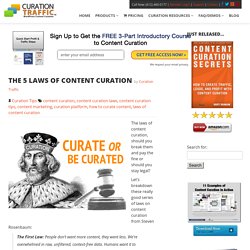
Let’s breakdown these really good series of laws on content curation from Steven Rosenbaum: The First Law: People don’t want more content, they want less. We’re overwhelmed in raw, unfiltered, context-free data. Humans want it to stop. This first law breaks down the core need of content curation. The Second Law: Curators come in three shapes. This is really good insight but one thing left unspoken is you can be one or all of these “shape of curators”. The Third Law: Curation isn’t a hobby, it’s both a profession and a calling. This is another really good point. The Fourth Law: Curation requires technology and tools to find, filter, and validate content at the speed of the real-time web. This is a big one. This is spot on and is one of the biggest mistakes early curators make. Please don’t take my commentary as these “laws” aren’t great, they are. See full story on thevideoink.com. Is Content Curation Legal?
As we learned with the Lean Startup method, users and prospects feedback play a big role in a startup success.

One of the worries some of our prospects told us are the legal aspects of the curated content. They formulated it in a lot of ways, but basically, what they wanted to ask us was: Am I going to be legally punished by using content from other people? The magical answer to this question is: It depends. Yes, I also hate when someone say this magical word and vanishes in that mysterious aura of wise. Recommended for YouWebcast: A Week in the Life of an Agile Creative Team Many people agree that using curated content can be a great and fast way to improve your online image. Is Content Curation Legal? As content curation and aggregation grow, questions about legality, ethics, copyright and fair use continue to swirl about it.

How to Use Content Curation to Create a Recurring Revenue Business. The Ultimate Guide to Content Distribution - NewsCred. Is Content Curation an Ethical Content Strategy? The question over the ethics involved with content curation is not a new debate.

It’s been going on for years, and I expect it to go on for years to come. Regardless of that continuing debate, one thing is certain; it’s a strategy that content marketers will continue to use and explore. But can they do it with a clear conscience? John Kuefler Is "content curation" fair use under copyright law? Individuals reposting content from other websites on via Facebook, Twitter or other social media is so common today that it’s hardly every questioned whether or not these actions infringe on an original author’s, photographer’s or artist’s copyright.
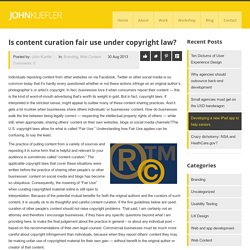
In fact, businesses love it when consumers repost their content — this is the kind of word-of-mouth advertising that’s worth its weight in gold. But in fact, copyright laws, if interpreted in the strictest sense, might appear to outlaw many of these content sharing practices. And it gets a lot murkier when businesses share others individuals’ or businesses’ content. How do businesses walk the line between being legally correct — respecting the intellectual property rights of others — while still, when appropriate, sharing others’ content on their own websites, blogs or social media channels? The U.S. copyright laws allow for what is called “Fair Use.” Here are the guidelines: 1. 2. 3. 4. 5. Is Content Curation Legal? Content Curation: Copyright, Ethics & Fair Use.
>>Click here to download the eBook.
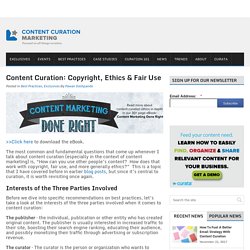
The most common and fundamental questions that come up whenever I talk about content curation (especially in the context of content marketing) is, “How can you use other people’s content? How does that work with copyright, fair use, and more generally ethics?” This is a topic that I have covered before in earlier blog posts, but since it’s central to curation, it is worth revisiting once again. Interests of the Three Parties Involved Before we dive into specific recommendations on best practices, let’s take a look at the interests of the three parties involved when it comes to content curation: The publisher – the individual, publication or other entity who has created original content.
The curator – The curator is the person or organization who wants to curate the content of the publisher and promote to their audience. The audience – Lastly, we have the audience who wants to consume the best and most relevant content in a convenient manner. The aggregator’s dilemma: How do you fairly serve your readers & the sources you rely on? When you aggregate content, what obligation do you have to the original source — and to readers?
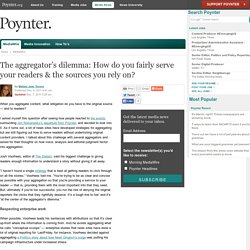
I asked myself this question after seeing how people reacted to the events surrounding Jim Romenesko’s departure from Poynter, and decided to look into it. As it turns out, a lot of news sites have developed strategies for aggregating but are still figuring out how to serve readers without undermining original content providers. I talked about this challenge with several aggregators and asked for their thoughts on how voice, analysis and editorial judgment factor into aggregation. Josh Voorhees, editor of The Slatest, said his biggest challenge is giving readers enough information to understand a story without giving it all away. “I haven’t found a single strategy that is best at getting readers to click through on all the stories,” Voorhees told me. Respecting enterprise work Relying on multiple sources, neutral voice. Curation 101. Best Practices. Content Curation: Copyright, Ethics & Fair Use. What’s the law around aggregating news online? A Harvard Law report on the risks and the best practices.
[So much of the web is built around aggregation — gathering together interesting and useful things from around the Internet and presenting them in new ways to an audience.
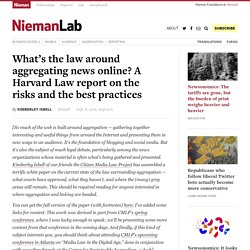
It’s the foundation of blogging and social media. But it’s also the subject of much legal debate, particularly among the news organizations whose material is often what’s being gathered and presented. Kimberley Isbell of our friends the Citizen Media Law Project has assembled a terrific white paper on the current state of the law surrounding aggregation — what courts have approved, what they haven’t, and where the (many) grey areas still remain. This should be required reading for anyone interested in where aggregation and linking are headed. You can get the full version of the paper (with footnotes) here; I’ve added some links for context. During the past decade, the Internet has become an important news source for most Americans. Is Content Curation Legal? Content Curation Tools: The Ultimate List. For content marketers, content curation is integral to online strategy.

Effective curation helps position you as a thought leader in your space, and is an economical way to maintain a consistent publishing schedule of quality content. But manually trying to find the most relevant content in a given industry and then publishing it across multiple channels can be time-consuming. To curate effectively thus requires automation. This ultimate list of content curation software includes both business-grade and personal curation tools for hobbyist or organizational purposes. Curata defines content curation as when an individual (or team) consistently finds, organizes, annotates, and shares the most relevant and highest quality digital content on a specific topic for their target market. This map was constructed to help you or your organization navigate the growing world of curation and find a tool that best fits your content needs.
The Practical (non-Legal) Guide to Curation and Copyrights. This question gets asked a lot, because many people use Shareist as a content curation platform.
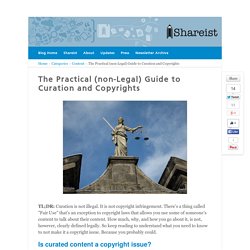
Which is great. Because it's killer for that. I suspect that most people shy away from answering it because it's a legal question. So I'll say first what everybody says (well except lawyers) when talking about this stuff: I'm not a lawyer. Is Content Curation Legal? Ethical Content Curation: A 10-Step Checklist. Fair Use: Online Content Curation. Is Content Curation Legal? Content Curation: Copyright, Ethics & Fair Use.